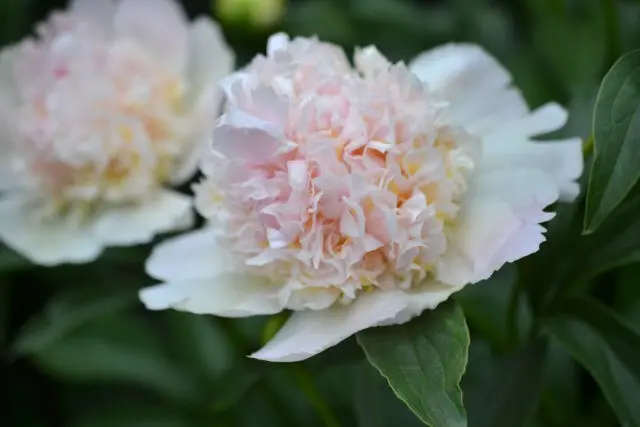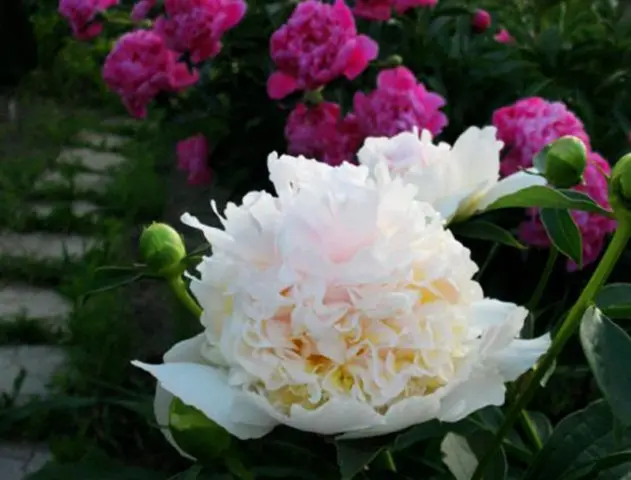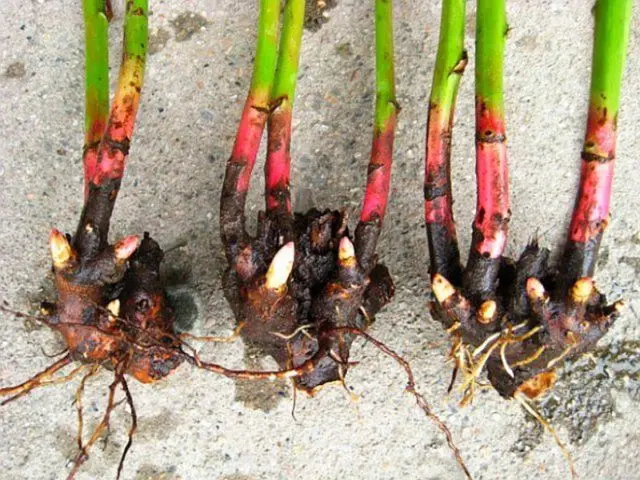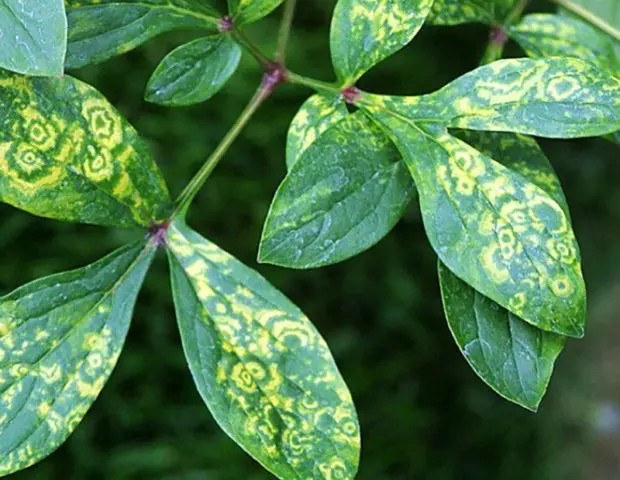Contents
Peony Top Brass is a herbaceous perennial plant of the lactiferous group with creamy pink spherical flowers. The variety was bred in the USA in 1968.
Description of Peony Top Brass
The bush reaches a height of 90-110 cm, a width of 100-120 cm. The peony grows quite quickly. The stems are slightly leafy, strong, able to independently withstand massive flowers. The leaves are large, smooth, dark green, double-pinnate with a glossy sheen. The rhizome of the Top Brass peony is large, with strong shoots. Able to grow in one place for more than 10 years.
Peony varieties Top Brass belongs to the 4th group of frost resistance, can withstand temperatures down to -34 degrees. The plant is grown in many regions, including the Moscow, Vologda and Chelyabinsk regions. Prefers sunny open areas or light partial shade.

Peonies Top Brass bloom up to 20 cm in diameter
Features of flowering
The flowers of the Top Brass variety are terry, in the form of a ball, bordered by two tiers of white petals. In the center, among the bright yellow staminodes, pink petals are formed, forming a tuft. Top Brass blooms once, profusely, 2-3 weeks in the second half of June, does not crumble for a long time. The aroma is light, barely perceptible. Sufficient light is important for flowering. Several buds grow on a branch, bloom sequentially. Seeds ripen at the end of August.
Application in design
It is recommended to plant with flowers of bright colors and next to fences and arbors covered with green foliage. Peonies are good in single plantings, but can also become an accent in landscape compositions. Variety Top Brass is used in rock gardens and rockeries, grown along paths in the garden and next to ponds. The bush is decorative until late autumn, serves as an excellent background for other plants. Suitable neighbors for Peony Top Brass:
- miniature conifers (dwarf pines, spruces, firs);
- roses;
- mallow;
- tulips;
- nasturtium;
- phlox;
- perennials with decorative foliage (hosta, barberry, thyme).
In flowerbeds, you should not combine more than 2 varieties of peonies – the flowers are bright and dominant, so the variety of shapes and colors will be excessive.

The combination of Top Brass with peonies of other varieties
Methods of reproduction
Top Brass can set seeds, but is more commonly propagated vegetatively. Seeds do not always retain varietal properties and bloom only 4-5 years after planting. The most popular way is dividing the bush. For this purpose, an adult plant is suitable, not younger than 4 years old, and preferably 5-6-year-old bushes. Division steps:
- The peony is dug in, carefully removed from the ground without damaging the root system, and shaken off the ground.
- Divide with a sharp knife into divisions with several buds and young roots (at least 10-15 cm).
- Broken and old parts of the plant are removed.
- The delenki are kept in a manganese solution for 30 minutes, the sections are treated with fungicides
It is desirable to share Top Brass from the end of August until the second half of September. Other, less common methods include propagation by stem cuttings and layering.
Rules of landing
Peonies are planted from August to October, in regions with a cold climate – until September.
Peonies prefer well-drained fertile soil. Neutral or slightly acidic loams are best suited. Sand and humus are added to excessively clay soil. In sandy – clay and peat.
Top Brass does not tolerate the close occurrence of groundwater and location in the lowlands. Peony rhizome is sensitive to moisture stagnation and rots easily.
Gardeners do not recommend planting Top Brass near buildings, shrubs and trees – air circulation is important for peonies.
When buying delenki in the nursery, pay attention to the absence of rot and nodular thickenings. It is important that the rhizome has several adnexal processes and buds for renewal.
Landing algorithm:
- It is advisable to prepare a landing pit for soil subsidence in advance. Depth and diameter of at least 50 cm, for large divisions – 60 cm.
- Drainage is laid out (expanded clay, pebbles, crushed brick, crushed stone, gravel).
- Fill with a nutrient layer – a mixture of garden soil, compost, sand, superphosphate or wood ash.
- Peonies Top Brass do not tolerate deep planting, the division is deepened by no more than 7 cm.
- Fall asleep with a mixture of soil and compost, water abundantly, gently tamp with your hands.
- When planting in hot weather, in order to avoid drying out of the roots, they mulch with a thin layer of compost or rotted manure.
When planting peonies in groups, they take into account that the bushes grow, so a distance of 1,5 m is left between the plants.

Peony seedlings ready for planting
Aftercare
Among the perennial flowers, herbaceous peonies are the most resistant and require minimal attention. Variety Top Brass, planted in fertilized soil, you can not feed the first 2-3 years. An adult plant at the beginning of shoot growth needs nitrogen and potassium, during the formation of buds and until the end of the growing season – potassium and phosphorus. Excess nitrogen is undesirable for peonies, as it increases the risk of developing gray rot. Top Brass is fertilized in the evening or on a cloudy day, otherwise there is a risk that the sun will dry out the fertilizer.
Good results are obtained by foliar top dressing – foliage treatment by spraying. Apply boric acid diluted in water in proportions of 1 g of the substance per 1 liter of liquid.
When watering, it is important to consider the main points:
- peony needs regular hydration, but stagnant water is undesirable;
- the plant especially needs irrigation during the growth period in early spring, as well as during flowering, budding and during drought;
- in summer, the Top Brass variety is watered abundantly every week (20 liters of water per bush);
- avoid getting moisture on leaves, stems and flowers;
- the roots of the plant grow in depth, so surface irrigation will not be effective.
- with the onset of autumn and yellowing of the leaves, watering is reduced.
To preserve moisture after watering and remove weeds, the soil must be loosened. The procedure is carried out carefully so as not to damage the root neck of the plant. Peonies are mulched with rotted manure, bark, gravel.
Preparation for winter
In autumn, the stems of the Top Brass peony are cut with pruners at ground level or small stumps are left. To prevent fungal diseases, the soil is treated with fungicides. A popular drug for these purposes is Fitosporin. Then the soil is covered with bone meal and ash and sprinkled with earth (an average of 1 bucket per bush).
After a cold snap and freezing of the soil, rotted horse manure is brought in from above. This nourishes the roots of the peony, contributes to the further formation of large buds and abundant flowering. Top Brass winters well under snow, but in regions with a cold climate or lack of precipitation, it is desirable to cover it. You can use special covering materials.
Pests and diseases
Variety Top Brass has good immunity and is resistant to many diseases. For peonies, fungal infections and insect pests are detrimental. The development of microorganisms occurs during stagnant water, excessive soil moisture, and sudden changes in temperature. Most often, peonies suffer from:
- gray rot (Botrytis, Botrytis paeonia). When infected, the buds rot, and the stems and leaves darken, becoming covered with brown spots. The mold fungus develops very quickly, which leads to wilting and falling of the bush;
- rust (Cronartium flaccidum). The fungus infects the leaves, covering them with brown spots and leading to drying;
- powdery mildew (Erysiphales). Leads to wilting of leaves, white bloom slows down photosynthesis, weakening the plant;
- septoria (Septoria macrospora), contributing to spotting and falling of leaves and shoots;
- ring mosaic (Peony ringspot virus). Symptoms are light spots with a characteristic pattern. Infected peonies are destroyed.

Ring Mosaic – Incurable Peony Virus
To prevent fungal diseases, Top Brass is treated with copper sulphate, dissolving the substance in water at a concentration of 50 g per 10 liters. Irrigate both the plant itself and the soil of the near-stem circle. Other warning factors include: timely pruning, moderate watering, and limited use of nitrogenous fertilizers.
With the development of the disease, peonies are treated with antifungal drugs – fungicides. Affected plants are burned.
Top Brass can be damaged by insects: ants, whiteflies, aphids. Insecticides are used for destruction.
The roots of Top Brass peonies are harmed by nematode worms, weakening the plant and leading to the formation of seals. Pesticides, such as phosphamide, are used for treatment.
Conclusion
Peony Top Brass is easy to grow in fertile, well-drained, sunlit areas. Frost-resistant and requires minimal care. Flowers of white-pink and lemon hue bloom at the end of June and have an unusual shape.









